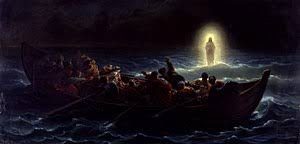Becoming Icons of God’s Love on Earth
(1 Jn 4:11-18; Ps 72; Mk 6:45-52)
*************************************************
Jesus and Moses were golfing one day, and it turns out Jesus was a great fan of Jack Nicklaus. If he hit a good shot, he would exclaim, “Yes, just like Jack Nicklaus!” If he hit a poor shot, he would complain, “Oh, if only I was like Jack Nicklaus.” Then Jesus hit a bad shot over a pond of water. Moses asked Jesus if he should part the water for him so he could get his ball. Jesus replied he would just walk over and get it himself, and proceeded to walk on the water. Another golfer came by, saw what was happening and asked Moses, “Who does that guy think he is, Jesus Christ?” Moses replied, “No, Jack Nicklaus!”
“… because as he is, so are we in this world.”
For some reason, this sentence stood out for me as a focal point for this homily, emerging as it did from the readings inviting us to become, in response to God’s love for us, icons of God’s love for the world.
The background for this message comes from the Old Testament. God chose the smallest and weakest of nations, liberated them from slavery in Egypt, gave them a new way of life on Mt. Sinai, and called them to be icons of God on earth: “Now if you will indeed obey My voice and keep My covenant, you will be My treasured possession out of all the nations—for the whole earth is Mine. And unto Me you shall be a kingdom of priests and a holy nation” (Exodus 19:5-6). The Israelites were to be, by their obedience to God and love for God, an attraction to all the nations and draw them back to the living God. Unfortunately, we know they failed miserably at this, the religious leaders sliding into corruption, and the people always falling for the false gods of possession, prestige and power.

Sunrise on Mt Sinai, 2013
Today’s readings remind us we are the new Israel, the new people of God, who are now called to be that special nation drawing all people back to the God of Jesus Christ. They also provide us with a process by which that transformation into being icons of God on earth takes place.
It begins with love. We rely on St. John, who sets the foundation starkly and simply: God is love, and in God there is no darkness. Not only that, God abides in us, and we are to abide in God’s love – a mutual indwelling. In Jesus Christ, God has revealed beyond the shadow of a doubt who God is (mercy, humility, gentleness, compassion, unconditional love, forgiveness and total non-violence) and how much God has loved us (there can be no greater love than that of Jesus Christ, from his humble birth among us, his selfless life of teaching and healing, and his ultimate sacrifice of his life on the cross, on which he revealed the depth of God’s love for us).
The challenge is for us to believe in that love, to truly grasp and integrate how loved we are, how there is nothing we can to do make God love us more than God already does. We turn to the gospel to address this dilemma, which also faced the disciples, who struggled to believe, to get it. We are told “they did not understand about the loaves” because their hearts were hardened. They did not “get” that Jesus was the Bread of Life for the world, that the miracle of the loaves signified Jesus was the only one who could fulfill the deepest yearnings of the human heart, that he was the Messiah and Son of God.
What we see happening in the gospel is, sadly, another case of the disciples not understanding a miracle – Jesus “walking on sea.” That too was a sign about who Jesus was and is. The sea, to the ancient mind, was the abode of the monster Leviathan, and symbolized the power of evil, darkness, the unknown, all that was fearful about life. Jesus walking on “the sea” (not just the water) proclaims he was more powerful than all evil, victorious over it, that they had no more reason to fear evil except to avoid doing it.
Had they understood this powerful sign of God’s love breaking into their lives, they would have been delighted. Actually, had they known the psalms better, they would have realized this event was actually fulfilling what could be seen as a prophecy in Psalm 107:23-32 (it is worth reading to see the connection – the one who walks on the sea and calms it must also be the one who “lifted up the waves of the sea”). But instead, they were terrified and thought he was a ghost! So, Jesus had to dispel their fear: “Take heart, it is I; do not be afraid.” Their faith was still weak and their love far from perfect, and so they were afraid.

We are the disciples of Jesus today, and challenged to move beyond their limited response, to put our complete faith in God who has loved us so much in Jesus Christ, and to respond by loving as Jesus has loved us, by being icons of God’s love on earth. St. John, speaking from a lifetime of pondering the mystery of God’s love through Jesus, adds encouragement upon encouragement to help us: Since God loved us so much, we ought to love one another. God lives in us, and wants his love to be perfect in us. More, God has given us the Spirit of his only Son, the Risen Lord, to abide in us so we can abide in him, and testify by our lives that God has sent his Son as Savior of the world.
Jesus shows us how to abide in God. After dismissing the crowds and sending the disciples off, he went up on the mountain to pray. Jesus, the Savior of the world, always spent, wasted time in prayer, communing with the Father, soaking up the Father’s love through intimate prayer to the Father. That too is another message for us – that we must do the same – spend time in contemplative prayer, just soaking up his and the Father’s love for us. We must enter deeply into his Word, and allow his Word to enter deeply into us. As we can only see the bottom of a container full of water when it is calm, so too we can only access the depths of God’s Spirit within us when we are calm and enter into serene silence, the language God speaks best.
Then, believing firmly in God who is love and only love, and secure in the knowledge and experience of that love, we can practice the spirituality of letting go. We can let go of all inordinate fear in our lives and especially of any stubborn self-will or “hardness of heart” that clings to us. We can more freely love one another as we love ourselves, love others as Christ has loved us, and love our enemies by forgiving them from the heart. Then we will truly reflect who God is for us, and become icons of God’s love on earth.
What comes to mind is Step 11 of the 12 Step program, which reads, “Sought through prayer and meditation to improve our conscious contact with God, seeking only the knowledge of God’s will for us and the power to carry it out.” Does this not succinctly capture the essence of these readings and the message they convey? Having faith in a God who is love (Steps 1-3); having experienced God’s love as forgiveness (Steps 4 & 5, 8 & 9), and having experienced God’s healing of our painful emotions and negative attitudes like hardness of heart (Steps 6 & 7), we can now practice these principles in all our affairs, and pass on to others the freedom, new life and serenity that is ours, to be an icon of God through a life of freedom from addiction. The complete Serenity Prayer also fits, with its observation that we can now accept hardships as a pathway to peace, without bitterness or resentment.
Barb shared with me recently a spiritual experience she had as she was going up to receive communion. She had come to church burdened with dark anger, furious at an injustice she had suffered. As she sadly approached the front, she focused on what she was receiving, the body of Christ who is forgiveness, felt a sudden surge of forgiveness flow through her to the one who had hurt her so deeply, and was delivered from all the anger and heaviness she carried. This had happened weeks earlier, and she was still glowing from the liberating effects of that spiritual experience. Even in the telling of the story, she was an icon of God’s love for me.
The Eucharist, for those who have faith, is actually another miracle of the loaves, as God lavishes God’s love on us through forgiveness, enlightens us through God’s Word, and heals us through communion with the body and blood of his own Son.
May our celebration deepen our faith in God’s overwhelming love for us, help transform us into Christlikeness, and empower us to go out into the world as icons of God’s love for us – living out the words of St John – “As he is, so are we in the world.”




You have so much lovely and inspiring teachings and words expressing God’s love and his experiences . You should be his icon through God’s love. We should be Icon of God’s love by praise and worshipping him daily by receiving his heartwarming experiences and his unconditional love. When we believe in God and decided to trust him then he will transform us to be Christ likeness . We should be living out his love and healing from our hearts and go out to spread his word to communities and other people. Our minds are set on God’s love every morning before we start our day of with chores and busy schedules . In the morning , we would say the sacred Heart of Jesus prayer and contemplative prayer as a morning prayer. He will watch over us and protect us from any harm and danger during the entire day. Amen. Des Coloures!
Thanks so much for those inspiring homilies and messages about receiving God’s love and having his experience . We are icons of God’s love by strengthening our faith by being devoted to Jesus Christ. We are to know and understand who is Jesus ; where is he from. Gracias! Bravo ! Bishop Sylvain Lavoie . ? May God Bless you !